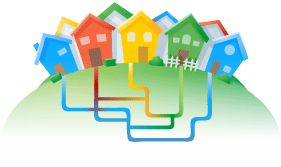What Google’s Experimental Fiber Network Means for Broadband
There’s been a lot of Buzz about what Google’s been up to in the last week or so. But as significant as Google’s move into social networking is, a less talked-about announcement the company made last week is the real big deal: Google’s plan to build an experimental 1 Gbps, fiber-to-the-home broadband network is likely to have a big impact on Internet policy in the US, especially net neutrality and broadband stimulus.
Google’s plan has been interpreted a number of different ways but it seems pretty clear that this is really about more than just giving developers a nice sandbox to play in and some lucky folks freaking fast Internet access. Google is very active in the goings-on at the FCC right now, including leading the advocacy for putting net neutrality principles into binding regulations for ISPs and pushing for open access standards and faster speeds to be part of the National Broadband Plan. By building this network, then, Google wants to show off to the FCC and ISPs just what an open, neutral, and really really fast network looks like. This move is consistent with the company’s propensity toward big symbolic gestures that can be influential whether or not the stated intentions actually get followed through on: its bid on wireless spectrum in 2007 was really a stunt to encourage open access and the threats to pull out of China (detailed here on Antenna by Liz Ellcessor) have not yet been acted on. This announcement alone has drummed up the kind of excitement that could work to raise the bar for the broadband deployment plan, which is especially crucial for bridging the digital divide with more than just access, but access that is open, neutral, and as fast as anyone in the world.




And the FCC just announced today that faster speeds will be part of the broadband deployment plan, directly citing inspiration from Google…
http://voices.washingtonpost.com/posttech/2010/02/fcc_chair_to_push_for_ultra_fa.html
Really interesting update Danny! Although you point out that Google often announces things that do not come to fruition, and even this announcement is limited packaged service companies should be eyeing this with concern. There has been a lot of talk about people “cutting the cord” on cable in favor of the internet as their content deliverer of choice. Similarly more and more people are declining to keep land lines. A lot of media providers not depend on packaging (people who keep their cable around because it is part of a package with their internet). I don’t know much about the National Broadband Plan or Google’s network but it seems that Google may be intending to have networks open to multiple service providers (please correct me if I’m wrong), introducing an element of service provider competition that could have effects beyond the internet.
Kyra, definitely interesting things to consider here and keep an eye out for.
In regard to your question (if I understand it correctly) about opening broadband infrastructure to multiple service providers, I think that might be something we wont wholly know until the plan comes out.
As far as I know, the most recent statements by the FCC note that requirements about cable and phone companies sharing their infrastructure with competition, are out the window. But yes, this was definitely something that was talked about and that several groups have openly come out and advocated.
It seems like there will be some tenets in the plan to foster competition, which could involve some form of sharing infrastructure, but I can’t see this happening without some manner of direct profit for individual ISPs involved. Questions of cost and affordability are center stage right now though, so who knows. . .
Danny, great post! I definitely think Google’s involvement and assumed propulsion of the US broadband efforts is worth taking a careful look at. Especially since Google, a multi-billion dollar company, seems to be driving innovation here.
And to offer a slightly different but related example of Google’s “propensity toward big symbolic gestures that can be influential whether or not the stated intentions actually get followed through on” — how about WiFi? Around 2005, Google announced that it would outfit Mountain View, CA (it’s west coast headquarters) with free WiFi access. By the middle of the following year, a large portion of Mountain View was indeed blanketed with WiFi. In fact, with the recent blackouts in Palo Alto, several reporters announced that they had to take up temporary shop in Mountain View thanks to the Google network. So, in this case, the company followed through. But I think the more apropos reading of this situation comes from the time of this investment, and Google’s comments about it.
In 2004 and 2005, several US municipal governments were having trouble forging successful public/private partnerships with ISPs. So, in accordance with the fashion you’ve outlined in your post, Google goes ahead and shows them how it’s done. Check out this statement from Minnie Ingersoll, Product Manager from 2006 to get a sense of what the motivation for the WiFi innovation/stunt might have been http://googleblog.blogspot.com/2006/08/free-citywide-wifi-in-mountain-view.html